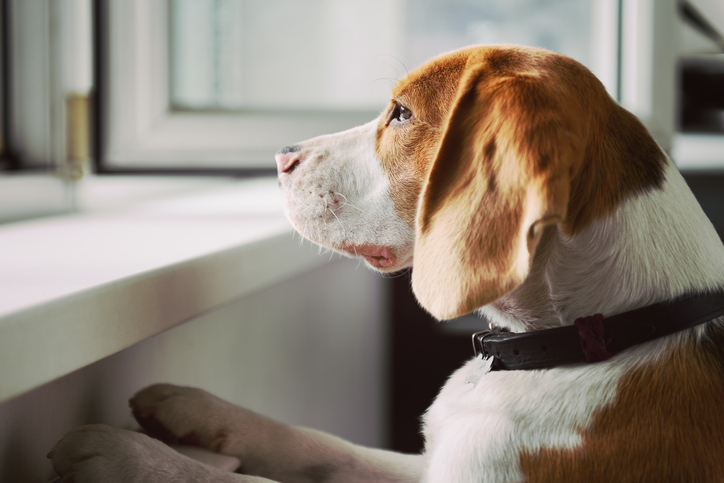If you have a dog who shows signs of separation anxiety, it’s important to work on training this behavior away. However, separation anxiety can be extremely difficult to deal with, and some dogs may respond better to training than others. In this article we will help you figure out some methods that may work in managing your dog’s separation anxiety so you can go back to living your life normally again.

Ways To Help Your Dog With Separation Anxiety
Struggling with separation anxiety in your dog can make even the simplest of errands challenging and stressful. Here are some tips and tricks to help your pet.
1. Relearn Leaving Cues
Leaving cues are actions you perform when you’re getting ready to leave the house. Putting on your coat and shoes, getting your keys, or saying “bye” to your family members may all be leaving cues to your dog.
You can help your dog relearn these cues to cut down on separation anxiety. Try putting on your coat and shoes, then sitting back down for a half hour. Say “bye” to someone, but then go cook dinner. Your dog will eventually forget what made him anxious in the first place.
2. Work a Little at a Time
Keep in mind that your dog isn’t going to get over his separation anxiety overnight. It will take time, and you’ll need to work slowly to get to that point. One way to do this is to start by simply stepping out of the house or into another room, out of your dog’s line of sight. Wait a few minutes, then return and give him treats if he’s been quiet.
Over time, you can increase the length of time you’re out of your dog’s sight. You can slowly start to increase the distance, too. Soon, he will start to learn that you will always come back—and sometimes with treats.
3. Crate Train
Crate training can go a long way toward helping your pet deal with separation anxiety. If you crate train your dog properly, he will start to see the crate as a safe space that is best used for taking naps. With enough time and patience, he will lay down and go to sleep in the crate, whether he’s alone or not.
Crate training takes a lot of work, but it pays off in the end. Make sure you use lots of high-value treats while working on crate training your pet.
4. Try Distracting Toys
Many dogs respond well to distracting toys when they have separation anxiety. If your dog is easy to redirect in other areas of his life—such as when he’s chewing on something he shouldn’t, for example—then you may want to try a distraction toy.
Kong toys are a great option for this purpose. These toys are designed to be filled with peanut butter, cheese spread, wet dog food, or other treats that are easy to squeeze or push into the toy. They can be frozen to encourage your dog to lick them even longer, as well. These toys can distract many dogs and keep their minds off of being left alone.
5. Consider Professional Training
Although you can certainly try to work on training your dog to cut down on separation anxiety, you may not have much luck on your own. If you’re having difficulty working with your dog due to stress or the severity of the anxiety, a professional trainer may be able to help.
A professional trainer can work with you to find the underlying problems associated with your dog’s separation anxiety. From there, the trainer can help you find the method that works best for helping your dog feel comfortable when no one is at home with him.
6. Consider Medication
Medicating your dog for anxiety may not be right for everyone, and it’s okay if you don’t want to jump into this option first. However, in severe cases of extreme separation anxiety, you may need to go this route.
Anxiety medication may help your dog feel calmer when he is left at home alone. However, it may also cause other behavioral changes, so you’ll need to work with your veterinarian to determine whether or not this choice is best for your pet.
Kryder & Harr Veterinary Clinic Is Here To Help with Your Dog’s Separation Anxiety in Granger, IN
Separation anxiety can put a lot of strain on your relationship with your dog and even with the rest of your household. By focusing on your dog’s needs for a while and really working to relieve the issues surrounding separation anxiety, you may be able to help him get through this problem.
Your vet will be able to help you determine when it’s time to call in a professional trainer or to try medication, and when you may want to try other options first. If you have any further questions or concerns about dog separation anxiety, don’t hesitate to talk to your veterinarian at Kryder & Harr Veterinary Clinic by calling (574) 277-6533.
Recent Posts
About Us
Welcome to Kryder & Harr Veterinary Clinic! Our animal hospital has been a fixture in the Granger community since 1981, practicing full-service veterinary medicine for all our pet parents and their furry family members. At KHVC, we pride ourselves on our history, of providing excellent customer service for our clients, along with dedicated, compassionate, and exceptional medical care for all of our patients.
